新外研版三起四年级下册英语
小学英语四年级下册课本知识点(外研版三年级起点)
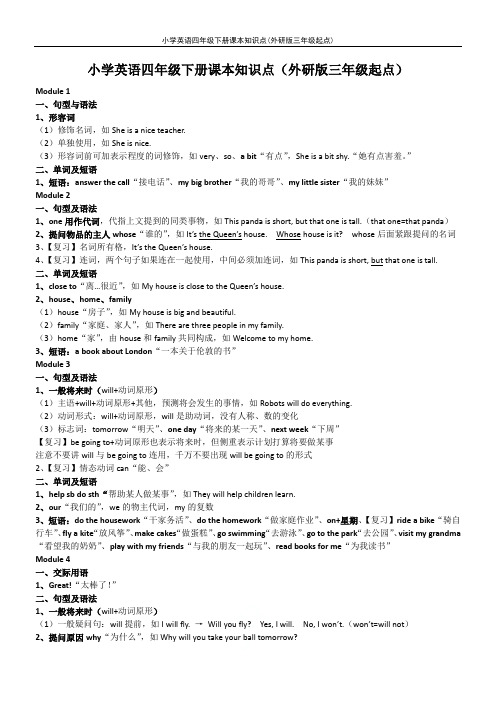
小学英语四年级下册课本知识点(外研版三年级起点)Module 1一、句型与语法1、形容词(1)修饰名词,如She is a nice teacher.(2)单独使用,如She is nice.(3)形容词前可加表示程度的词修饰,如very、so、a bit“有点”,She is a bit shy.“她有点害羞。
”二、单词及短语1、短语:answer the call“接电话”、my big brother“我的哥哥”、my little sister“我的妹妹”Module 2一、句型及语法1、one用作代词,代指上文提到的同类事物,如This panda is short, but that one is tall.(that one=that panda)2、提问物品的主人whose“谁的”,如It’s the Queen’s house. Whose house is it? whose后面紧跟提问的名词3、【复习】名词所有格,It’s the Queen’s house.4、【复习】连词,两个句子如果连在一起使用,中间必须加连词,如This panda is short, but that one is tall.二、单词及短语1、close to“离…很近”,如My house is close to the Queen’s house.2、house、home、family(1)house“房子”,如My house is big and beautiful.(2)family“家庭、家人”,如There are three people in my family.(3)home“家”,由house和family共同构成,如Welcome to my home.3、短语:a book about London“一本关于伦敦的书”Module 3一、句型及语法1、一般将来时(will+动词原形)(1)主语+will+动词原形+其他,预测将会发生的事情,如Robots will do everything.(2)动词形式:will+动词原形,will是助动词,没有人称、数的变化(3)标志词:tomorrow“明天”、one day“将来的某一天”、next week“下周”【复习】be going to+动词原形也表示将来时,但侧重表示计划打算将要做某事注意不要讲will与be going to连用,千万不要出现will be going to的形式2、【复习】情态动词can“能、会”二、单词及短语1、help sb do sth“帮助某人做某事”,如They will help children learn.2、our“我们的”,we的物主代词,my的复数3、短语:do the housework“干家务活”、do the homework“做家庭作业”、on+星期、【复习】ride a bike“骑自行车”、fly a kite“放风筝”、make cakes“做蛋糕”、go swimming“去游泳”、go to the park“去公园”、visit my grandma “看望我的奶奶”、play with my friends“与我的朋友一起玩”、read books for me“为我读书”Module 4一、交际用语1、Great!“太棒了!”二、句型及语法1、一般将来时(will+动词原形)(1)一般疑问句:will提前,如I will fly. →Will you fly? Yes, I will. No, I won’t.(won’t=will not)2、提问原因why“为什么”,如Why will you take your ball tomorrow?(1)回答:Because we are going to have a picnic tomorrow.(2)Why not?“为什么不呢”,Why won’t you do sth?=Why not do sth?eg:Why won’t you take your ball tomorrow? = Why not take your ball tomorrow?3、连词because“因为”、so“所以”,注意英语中because和so不能连用eg:Because we are going to have a picnic tomorrow, I will take my kite.We are going to have a picnic tomorrow, so I will take my kite.【复习】so“如此、这么”,如It is so hot today.4、询问天气What will be the weather?“天气怎么样?”,回答It will be+形容词,如It will be sunny.注意:will后要求加动词原形,am/is/are的原形是be,如It is sunny today. →It will be sunny tomorrow.三、单词及短语1、take“带着、拿着”,如take your kite“带着你的风筝”【复习】take“拍摄”,如take pictures“拍照”2、名词变形容词:sun-sunny、cloud-cloudy、wind-windy3、短语:have a picnic“去野餐”、【复习】in+地点,如in HaikouModule 5一、句型及语法1be动词)(1)主语+be动词过去式+其他,表示过去的情况,如I was two then.“我那时两岁”←I am ten now.“我现在十岁。
外研版小学英语(三起)四年级下册Module2Unit2教材内容全解

外研版小学英语四年级下册Module2Unit2教材内容全解Module2Unit2教材内容全解Module2Unit2 It’s very old.它非常古老。
1.Listen ,point and say.听一听,指一指,说一说【情景详解】英语描述:Two birds are talking about their homes.汉语描述:两只小鸟正在谈论它们(各自)的家。
【课文全译】This is my home.It’s old. 这是我的家。
它非常古老。
This is my home.It’s very famous.这是我的家。
它非常著名。
【课文注解】①home(名词)家,短语:at home在家,例句:We have a beautiful home in the city.我们在城市里有个美丽的家。
【辨析】home,house和family:home的意思是“家”,主要指一个人出生或居住的地方,因而也有“家乡,故乡”的意思,它具有house 所没有的感情色彩(如“团聚”“思念”等)。
house的意思是“房屋,住宅”,一般指家人所居住的建筑物。
family的意思是“家庭,家庭成员”,与居住的房子无关。
例句:My family are very nice.我的家人很友好。
There are many new houses in our village.我们村里有很多新房子。
I always stay at home on Sundays.我经常周日呆在家里。
②old(形容词)年代久的,古老的,例句:Some houses in the city are very old.城市里的一些房子年代已经很久远了。
old的反义词new 新的,例句:I have a new skirt.我有一条新女裙。
old作形容词时,还可意为“老的,年老的”,反义词是young年轻的,例句:We should respect the old people.我们要尊敬老年人。
外研版四年级下册英语单词音标表(三年级起点)

## game
游戏;比赛
[geim]
## last
最近过去的
[lɑ:st]
## fun
有趣的事
[fʌn]
## went
[went] (go的过去式)去…
## there
在那儿
[ðeə]
## ate
[et] 吃(eat的过去式)
## drank
[dræŋk] 喝(drink的过去式)
[nais] 友好的,亲切的,讨人喜欢
的
聪明的
['klevə]
淘气的
['nɔ:ti]
有一点
害羞的 接(电话)
[ʃai] ['ɑ:nsə]
电话,打电话
[kɔːl]
不好的,坏的
[bæd]
酷的 阿姨;姑妈;伯母 叔叔,伯伯,舅父
[ku:l] [ɑ:nt] ['ʌŋkl]
年龄较大的
[teik]
97 fly
飞
[flai]
98 picnic
野餐
['piknik]
99 great
太好了
[greit]
## why
为什么
[wai]
## Why not
为什么不呢?
## because
因为
[bi'kɔ:z]
## so
所以
[səu]
## cloudy
多云的
['klaʊdi]
[big]
小的,年幼的
['litl]
可爱的 象;大号图画纸 朋友
[kju:t] [ˈɛləfənt]
外研版三起小学英语四年级下册单词表(带音标)

珍妮特教育国际音标班拼读版四年级英语下册姓名Module 1nice[nais]友好的,亲切的clever['klevə]聪明的naughty['nɔ:ti]淘气的a bit 有一点shy[ʃai]害羞的answer['ɑ:nsə]接(电话) call[kɔːl] 电话,打电话bad[bæd]不好的,坏的cool[ku:l]酷的aunt[ɑ:nt]阿姨;姑妈;伯母uncle['ʌŋkl]叔叔,伯伯,舅父big [b i g]年龄较大的little['litl]小的,年幼的cute[kju:t]可爱的Module 2city['s i t i] 城市ship[ʃi p] 船beautiful['bju:təfəl]美丽的whose[hu:z]谁的queen[kwi:n] 女王close[kləʊs] 近的,接近的old[əuld]古老的famous['feiməs]著名的Module 3robot['rəubɔt]机器will[w i l] 将,将会everything['evriθiŋ]所有事情one day(将来)有一天housework['hauswə:k]家务learn[lə:n]学习our['auə]我们的homework['həumwə:k]家庭作业won't[wəʊnt]=will not将不会Monday['mʌndei]星期一Tuesday['tju:zdi]星期二Wednesday['wenzdi]星期三Thursday['θə:zdi]星期四Friday['fraidi]星期五Saturday['sætədi]星期六Sunday['sʌndi]星期日have[hæv]有,拥有next[nekst]下一个的week[wi:k] 星期,周holiday['hɒl i de i] 假期Module 4take[teik]带走,拿走,fly[fla i]飞picnic['piknik]野餐great[greit]太好了why[wai]为什么Why not为什么不呢?because[bi'kɔ:z]因为so[səu]所以cloudy['klaʊd i] 多云的weather['weðə]天气Module 5was[wɒz]是(am/is的过去式)then[ðen]当时,那是grandparent(外)祖父(母)['grænd,pɛərənt]were[wə]是,(are的过去式)young[jʌŋ]年轻的old[əuld]年长的hair[hɛə]头发so[səu] 这么,那么short[ʃɔ:t] 短的long[lɔŋ]长的wasn’t=was not不是weren’t=were not不是clean[kli:n] 干净的dirty['dɜ:t i] 脏的Module 6yesterday['jestəde i] 昨天out [aʊt] 不在家well[wel] 健康的thanks[θæŋks] 谢谢sun[sʌn] 太阳lesson['lesn] 一堂课village['v i l i dʒ]乡村Module 7had[hæd](have的过去式)度过phone[fəun]打电话cook[kuk]烹饪,烧(菜)really['r iəl i] 真的wash[wɒʃ] 洗what[wɒt] about[ə'baut]…?…怎么样?did[d i d](do的过去式)助动词d idn’t=did not 没有computer[kəm'pju:tə]计算机;电脑love[lʌv]爱,喜欢him[h i m]他(宾格)Mrs['misiz]太太;夫人Miss[m i s] 小姐Module 8sang[sæŋ]唱歌beautifully['bju:təfli]优美地saw [sɔː](see的过去式)看见game[ge i m]游戏;比赛last[lɑ:st]最近过去的fun[fʌn]有趣的事went[went] (go的过去式)去…there[ðeə]在那儿ate[et]吃(eat的过去式)drank[dræŋk]喝(drink的过去式)time[ta i m]一段时间have a good time玩得开心busy['b i z i]忙碌的took[tʊk]拍摄(take的过去式tell[tel] 告诉great[gre i t]非常好的delicious[d i'l iʃəs]美味的;可口的made[me i d]做,制成(make的过去式)poster['pəʊstə]海报,招贴画Module 9welcome['welkəm] 欢迎postcard['pəʊskɑːd]明信片cousin['kʌzn]堂兄弟姊妹;表兄弟姊妹dear[d iə] 亲爱的on holiday['hɒl i de i]在休假travel['trævl] 旅行came[keim]come的过去式来pop[pɒp]流行音乐concert['kɒnsət]音乐会earth[ɜːθ]地球Module 10fall[fɔːl]掉下,落下fall off 跌落fell[fel](fall的过去式)掉下,落下fall down 摔倒,跌倒found[faʊnd]发现,找到town[taʊn] 城镇,市镇happen['hæpən]发生ride[raid]骑,乘then[ðen]然后thirsty['θə:sti]口渴water['wɔ:tə]水bought[bɔ:t] (buy)买watermelon['wɔ:tə,melən]西瓜carried['kærid](carry的过去式)拿,搬bump[bʌmp]磕、碰hospital['hɒsp i tl]医院had[hæd](have的过去式)吃,喝chocolate['tʃɒklət]巧克力stomachache['stʌməkeik]胃疼cold[kəuld]感冒headache['hedeik]头疼fever['fi:və]发烧。
英语外研新标准(三起)四年级下册-Module 4 Unit 1 Will you take you
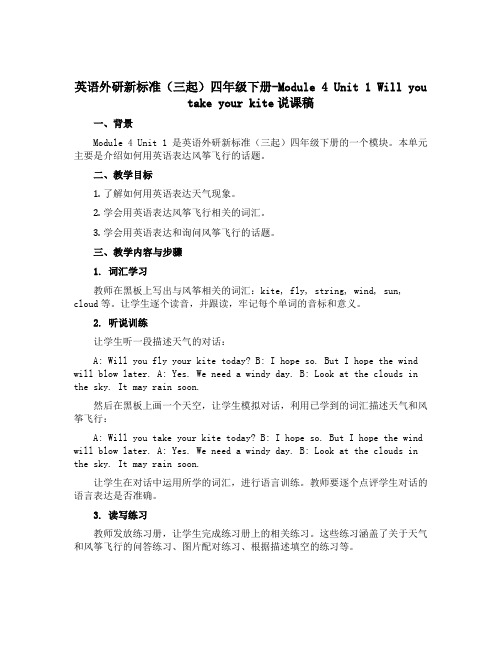
英语外研新标准(三起)四年级下册-Module 4 Unit 1 Will youtake your kite说课稿一、背景Module 4 Unit 1 是英语外研新标准(三起)四年级下册的一个模块。
本单元主要是介绍如何用英语表达风筝飞行的话题。
二、教学目标1.了解如何用英语表达天气现象。
2.学会用英语表达风筝飞行相关的词汇。
3.学会用英语表达和询问风筝飞行的话题。
三、教学内容与步骤1. 词汇学习教师在黑板上写出与风筝相关的词汇:kite, fly, string, wind, sun, cloud等。
让学生逐个读音,并跟读,牢记每个单词的音标和意义。
2. 听说训练让学生听一段描述天气的对话:A: Will you fly your kite today? B: I hope so. But I hope the wind will blow later. A: Yes. We need a windy day. B: Look at the clouds in the sky. It may rain soon.然后在黑板上画一个天空,让学生模拟对话,利用已学到的词汇描述天气和风筝飞行:A: Will you take your kite today? B: I hope so. But I hope the wind will blow later. A: Yes. We need a windy day. B: Look at the clouds in the sky. It may rain soon.让学生在对话中运用所学的词汇,进行语言训练。
教师要逐个点评学生对话的语言表达是否准确。
3. 读写练习教师发放练习册,让学生完成练习册上的相关练习。
这些练习涵盖了关于天气和风筝飞行的问答练习、图片配对练习、根据描述填空的练习等。
4. 语音练习在黑板上画出单词fly的发音,让学生模仿教师的发音,注意每个音的发声。
外研版三年级起点四年级下册知识点总结
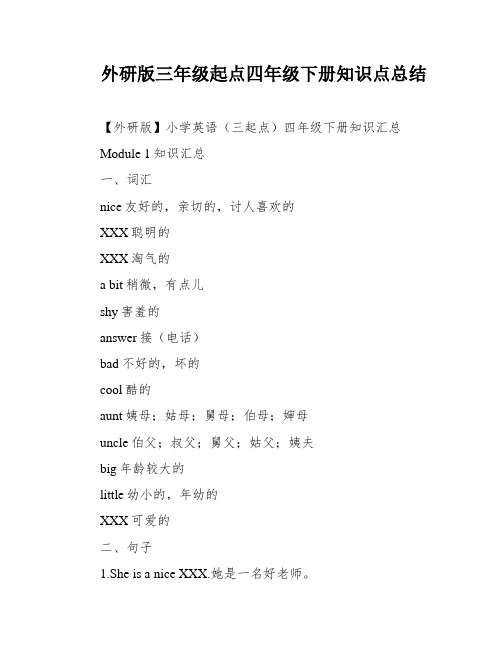
外研版三年级起点四年级下册知识点总结【外研版】小学英语(三起点)四年级下册知识汇总Module 1知识汇总一、词汇nice友好的,亲切的,讨人喜欢的XXX聪明的XXX淘气的a bit稍微,有点儿shy害羞的answer接(电话)bad不好的,坏的cool酷的aunt姨母;姑母;舅母;伯母;婶母uncle伯父;叔父;舅父;姑父;姨夫big年龄较大的little幼小的,年幼的XXX可爱的二、句子1.She is a nice XXX.她是一名好老师。
2.Look。
XXX XXX.看,大象很聪明。
3.XXX!鹦鹉很淘气。
4.This is my XXX.这是我阿姨。
5.He’s a bit shy.他有点害臊。
6.This is Maomao。
She’s nice。
But she’s a bit shy.这是XXX。
她很可爱。
可是有点害臊。
三、句型结构介绍或人(是谁、性情特性)This is。
He / She is +描绘人物性情特性的描绘词.eg: This is XXX.这是我叔叔。
他很高很伶俐。
This is my teacher。
She is thin and nice.这是我的教师。
她很瘦很漂亮。
4、单词辨析little和smallXXX表示“小的”,带有感情色彩small主要指的是“尺寸”、“重量”等,本身不带任何感情色彩eg: I have a little sister.我有一个小妹妹。
(含有“喜爱”的意义)The box is too small.盒子太小了。
(纯真指的是盒子的大小)Module 2知识汇总1、辞汇city城市ship船beautiful艳丽的whose谁的XXX女王close近的,接近的old年代久的,古老的famous有名的景点称号:Buckingham Palace白金汉宫Big Ben大本钟Hyde Park海德公园Tower Bridge塔桥XXX二、句子1.—What’s this?这是甚么?—It’XXX.是关于伦敦的一本书。
外研版英语四年级下册教案备课(三年级起点)
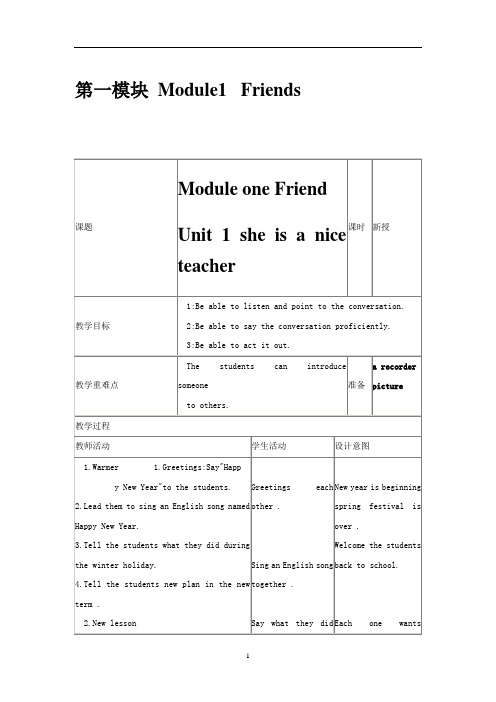
pupils' ability of
saying .
They can improve the ability of hearing.
They can improve
the ability of
hesring .
According to the
explanation ,the
pupils can
understand the
tsxt better.
The pupils can
know more each
other .
课后反思
This lesson is so easy .I teach them read only some times ,the students can say it well.
It's very beautiful.
2. Be able to describe places or things.
教学重难点
Be able to describe places or things.
准备
Pictures
a recorder
教学过程
教师活动
学生活动
设计意图
I.Warmer
1. Revise abjectives
2. Be able to do according to the teacher’s order .
教学重难点
Be able to describe a city or a place.
准备
a recorder
教学过程
教师活动
学生活动
设计意图
I.Warmer
1.Move around the cla
外研版小学英语(新标准三起)四年级下册M5教学设计

教材分析本课时的课文情景是Amy到Lingling家做客,看到Lingling家墙上挂着一张黑白照片,于是就问Lingling照片上是谁。
Lingling告诉Amy,照片上是自己的爷爷奶奶,他们那时还很年轻。
Lingling又给Amy看爷爷奶奶现在的照片,他们已经很老了。
Amy又问旁边的小女孩是谁,Lingling告诉Amy那是自己2岁时的照片,那时她的头发很短,现在已经长长了。
Amy认为那时的Lingling很可爱,而Lingling回忆说自己那时也很淘气。
在生活中,我们也会遇到类似的情景,谈论老照片,谈论自己或家人的过去与现在的不同,这种情景很贴近生活,利于学生理解掌握。
课时教学目标一、知识目标1. 能听、说、读、写单词:was, were, then, young, old, short, long, hair2. 能用They were young then. I was two then. 谈论过去的状态。
二、能力目标学生能够运用was和were来描述自己或他人过去与现在状态的变化。
三、情感目标通过对比过去和现在的变化,教育学生要学会感恩,感恩父母、亲人、老师和朋友。
教学重点与难点教学重点与难点:1. 能听懂、会说、会读句型:I was…then. They were… then.2. 能够区别运用am, is, are和was, were, 来对比描述自己或他人过去与现在状态的变化。
教学辅助OHP, video, word cards教学策略在教学的过程中采用任务型教学法,采用小组合作学习的方式,以兴趣激发学生,以任务驱动教学。
教学内容(含时间设置)教学活动设计意图教师活动学生活动Step 1: Warm up (about 3 minutes) 唱歌曲:I’m Short And You Are Tall.在节奏感十足的音乐背景的渲染下,既营造了良好的英语学习氛围,又对本课相关的学习内容进行了复习,为下面的学习做好了铺垫。
外研版小学英语(三起)四年级下册Module4Unit1教材内容全解

外研版小学英语四年级下册Module4Unit1教材内容全解Module4Unit1教材内容全解Module4Unit1 Will you take your kite?你将要带着你的风筝吗?1.Listen ,pointand say.听一听,指一指,并说一说。
【情景详解】英语描述:Two cats and two birds are standing in thetree.A bird says it will fly and it flies.A cat says itwill fly but it falls down.The other cat says itwon’t fly.汉语描述:两只猫和两只鸟正站在树上。
一只鸟说它将要飞并且它飞了(下去)。
一只猫说它将要飞,但是它掉了下去。
另一只猫说它不要飞。
【课文全译】I will fly. 我将要飞。
I will fly too. 我也将要飞。
Will you fly? 你将要飞吗?No,I won’t. 不,我不要。
【课文注解】fly(动词)飞,第三人称单数形式flies,过去式flew,短语:fly a kite放风筝,fly away飞走,例句:Can birds fly?鸟会飞吗?另外,fly还可以当名词用,意为“苍蝇”。
2.Listen,point and find“Will you…?”.听一听,指一指,并找到“Will you…?”【情景详解】英语描述:The Smarts are going to have a picnic onSaturday.Sam hopes that Amy can take the kite andthe ball tomorrow.But Amy can’t.Becausetomorrow is Friday.Sam is a little careless.汉语描述:斯玛特一家打算在星期六去野餐。
英语外研新标准(三起)四年级下册-Module7 Unit1 I helped Mum教案

英语外研新标准(三起)四年级下册-Module7 Unit1 I helpedMum教案教学目标•学生能够听懂、会说、会读、会写单词:wash, dishes, make, bed, tidy, room。
•学生能够根据提示完成句子:I helped Mum wash the dishes. I helped Mum make the bed. I helped Mum tidy the room。
•学生能够听懂、会说、会读、会写句型:I helped Mum wash the dishes.I helped Mum make the bed. I helped Mum tidy the room。
教学准备•PPT课件、教学录音、单词卡片、句型卡片。
教学内容与过程1. 自我介绍教师和学生互相介绍自己的名字、年龄和家庭情况。
2. 引入新词汇通过图片和实物,介绍新单词wash, dishes, make, bed, tidy, room,并教授其发音。
3. 学生听录音跟读播放教学录音,让学生跟读单词并朗读句子。
4. 学生拼读单词将单词打乱,让学生拼读单词。
5. 单词记忆游戏教师出示单词卡片,让学生快速记忆,并在教师叫出单词时迅速举起卡片。
6. 句子填空出示句型卡片,让学生根据提示填空:I helped Mum ________ the dishes.I helped Mum ________ the bed. I helped Mum ________ the room。
7. 句子编造以“I helped Mum”为开头,让学生自行编造剩余内容的句子。
8. 句型练习教师出示图片,让学生根据图片描述:“I helped Mum wash the dishes. I helped Mum make the bed. I helped Mum tidy the room。
”教学反思通过本节课的教学,学生们成功学习了新单词wash, dishes, make, bed, tidy, room,并掌握了句型I helped Mum wash the dishes. I helped Mum make the bed. I helped Mum tidy the room。
小学英语外研版(三起)四年级下册Module4__Unit2__will_it_be_hot_in_Haikou

Read
It will be hot in Haikou tomorrow. On Friday I will fly my kite.
Will it rain in Beijing? Yes, it will.
Homework:
1 Read the passage. 2 听天气预报并用英文写至少3个城 市的天气预报。如:It will be ___ in ____.
Choose.
1 Will it
(sunny\be sunny) next (will be\will) cold tomorrow.
week? 2 It
3 Will it (rain\snowy) on Sunday. 4 Will it be hot tomorrow? No, it (will\won’t). 5 I will (fly\flying) my kite.
Yes, it will.
Yinchuan
It will be cold in Yinchuan.
No, it won’t.
Will it snow in Hangzhou?
Hangzhou
It will rain in hangzhou.
Will it rain in Shenyang?
Shenyang
4. Saturday, I’ll go to the park. A. On B. At
5. It will snow, tomorrow I will make a snow man. A. So B. Because 6. It will on Sunday. A. sunny B. rain
Match.
1.
A.---Will it be cold tomorrow?
外研版小学英语(三起)四年级下册Module2Unit1教材内容全解

外研版小学英语四年级下册Module2Unit1教材内容全解Module2Unit1教材内容全解Module2Unit1 London is a big city.伦敦是一个大城市。
1.Listen,point and say.听一听,指一指,说一说【情景详解】英语描述:There are two pictures in this part.There is ashort panda and a tall panda in the firstpicture.There is a big ship and a small ship in thesecond picture.汉语描述:在这部分有两幅图。
在第一幅图里,有一只矮的熊猫和一只高的熊猫。
在第二幅图里,有一艘大船和一艘小船。
【课文全译】This panda is short,but that one is tall. 这只熊猫很矮,但是那只很高。
This ship is big,But that one is small. 这艘船很大,但是那艘很小。
【课文注解】①ship(名词)船,形近词shop商店,近义词boat 小船,短语:by ship乘船(My father goes to Hainan by ship.),【辨析】ship—boat,boat指的是小船;ship指大一点的船,能装货物的船;例句:This is a big ship.这是一艘大船。
There is a boat on the river.河上有一条小船。
②one在该处具有名词性质,用来代替前面提到的可数名词单数,以避免重复。
如:I have a sister.She has one too.我有姐姐。
她也有(姐姐)。
This book is good.That one is goog,too.这本书好。
那本书也好。
This apple is red.But that one is not red.这个苹果是红色的,但那个不是红色的。
外研版英语(三起点)四年级下册全册教案(教学设计)

外研版英语四年级下册全册教案学校:____________教师:____________2020年3月Module 1Unit 1 She’s a nice teacher.知识目标:a) 能听、说、认读下列单词:nice、clever、shy、naughtyb) 能听懂、会说下列句型:He’s / She’s a bit/ very …c) 初步了解转折的表达方式:She’s very nice. But she’s a bit sh y. 能力目标: 能简单描述周围人的性格特征、个性特点。
情感目标:能用英语向他人介绍某人的性格特征、个性特点,培养学生认真观察、善于观察的好习惯,进一步通过活动使学生热爱英语,培养学生团结友爱、互帮互助的良好习惯。
教学重点:描述性格的形容词汇与句型的学习和运用。
教学难点:描述周围人的性格特征、个性特点。
教具:学图片、单词卡片、单词陀螺、课件。
每人一张人物个性特点调查表。
教学过程Ⅰ热身复习. (3’)①问候:T——S②听唱歌曲《The more we get together.》(学生一边拍手一边唱)Ⅱ呈现新授(20’)通过歌曲引出本课的话题T:This is a song about friends. Today we will talk about our friends. let’ssee who can describe his\her friends best. And let’s see which group is the best in this class.T: Now the first, let’s recognize Panpan’s fr iends. 课件出示Panpan’s的四位朋友Do you want to know how does Pan-pan appraise his friends?播放录音,让学生们回答下列问题(1)What are their friends names?(2)What is each person’s temperament?让学生尽可能用英语回答问题.(1)课件出示毛毛的图片T: Who is she? (Maomao)What’s she like? (nice \a bit shy)S: She’s nice.T: Yes. And she’s nice. But a bit shy(课件出示单词、教读、拼读单词)nice. a bit shy(板贴图片、板书单词)S: Practise in groups.(因为以前曾经接触过,所以由学生来当小老师进行检查)T: Who is nice in our class?(学生通过观察,根据实际情况回答问题,对单词和句子有更深刻的理解)(2)教师用同的方法出示小勇的图片新授单词clever(3)教师用同的方法出示鹦鹉的图片新授单词naughtyⅢ课文学习(5’)1、教师播放录音,学生边听边用手指出相应的图片。
外研版三起小学英语四年级下册M1-M3课文翻译

☞外研版三起小学英语四年级下册M1-M3课文翻译Module 1 Unit 1 Listen point and find“She's、He's...”英语课文翻译Hello.They are my friends.你们好。
他们是我的朋友。
This is Maomao.She's very nice.这是毛毛。
她非常友好。
But she's a bit shy.但是她有点儿害羞。
This is Ms Smart.She's a nice teacher.这是斯玛特女士。
她是一位亲切的老师。
This is Xiaoyong.He's a clever pupil.这是小勇。
他是一个聪明的学生。
And this is Parrot.这是帕罗特。
Can you answer the call now?你现在能接电话吗?Parrot is very naughty!But he's not a bad bird.帕罗特非常淘气!但是它不是一只坏鸟。
Ha ha...哈哈……Module 1 Unit 2 Listen and chant.英语课文翻译This is my mother.这是我妈妈。
She's a nice teacher.她是一位亲切的老师。
This is my father.这是我爸爸。
He's very clever.他非常聪明。
Module 1 Unit 2 Listen and say.英语课文翻译This is my aunt.She's very nice.这是我婶母。
她非常友好。
This is my uncle.He's very clever.这是我叔父。
他非常聪明。
This is my big brother.He's cool.这是我哥哥。
他很酷。
This is my little sister.She's cute.这是我妹妹。
外研版三年级起点四年级英语下册教学计划

外研版三年级起点四年级英语下册教学计划全文共5篇示例,供读者参考外研版三年级起点四年级英语下册教学计划篇1一、学术情况分析:经过一年多的英语学习,学生对英语有了一定的了解,大多数学生的学习兴趣不断上升。
在课堂上,他们主动举手,气氛活跃,大多数学生都能按时完成作业。
但是少数学生学习积极性不高,纪律不严,作业慢,学习效果差,缺乏家长的积极配合,英语学习能力两极分化。
二、教学目的和要求本教材的教学目的是激发学生学习英语的兴趣,培养他们学习英语的积极态度,使他们建立学习英语的自信心。
培养学生具有一定的语感,良好的语音、语调、写作基础和良好的学习习惯;使他们具备简单的英语日常交流能力。
同时,培养学生的观察、记忆、思维、想象和创造能力。
适当介绍中西文化,培养学生的爱国主义精神,增强世界意识,为学生的进一步学习打下良好的基础。
三、教学重点和主要目标:这本教科书的特点是:1、强调语言的'运用。
2、注重能力培养3、突出兴趣刺激4、注意双向沟通5、整合主题内容6、注意灵活扩张7、实现整体设计。
本教材分为六个单元和两个复习单元。
教材强调语言的运用、能力的培养、兴趣的激发、双向交流、学科内容的整合、灵活拓展和整体设计的实现。
教学重点和主要目标:1、能听懂并说出12组对话,能简单交流。
2、能听、说、读60个单词和短语,能听、说、读、写61个单词和24个句子(包括学校、时间、衣服、天气、购物、农场动物、数字、颜色等话题),使用简单。
3、能够倾听并做6个tpr活动。
4、可以学习3个小制作。
5、会唱8首歌。
6、会听,会说,会唱7首民谣。
7、能够完成6项自我评价活动。
8、能看懂6个幽默故事。
9、能够理解6个简单的中西文化知识。
四、教学方法和措施:鉴于以上原因,这学期我将从以下几个方面着手教学:1、教学与现场表演相结合。
2、使用物品、头饰、卡片、圣歌等。
熟练地帮助单词教学。
3、利用阅读和写作课指导学生写单词。
4、继续加强基础部分的教学,同时采取小老师带徒弟的方式帮助学习落后的学生。
外研版(三起)小学英语四年级下册Module 3知识点汇总
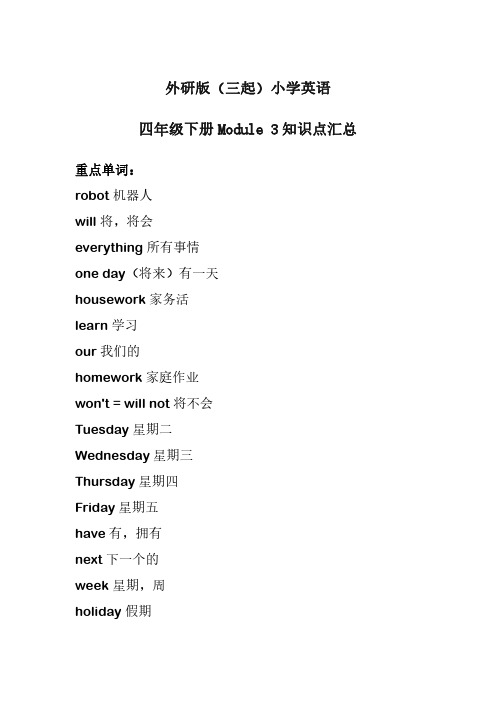
外研版(三起)小学英语四年级下册Module3知识点汇总重点单词:robot机器人will将,将会everything所有事情one day(将来)有一天housework家务活learn学习our我们的homework家庭作业won't=will not将不会Tuesday星期二Wednesday星期三Thursday星期四Friday星期五have有,拥有next下一个的week星期,周holiday假期短语:will+动词(原形)表示“将来做...”1、do everything做所有事2、fly a kite放风筝3、do the housework做家务4、help children learn帮助孩子们学习5、do our homework做我们的作业6、next week下周7、a holiday一个假期8、go swimming去游泳9、play with my friends和我的朋友玩10、go to the park去公园11、do my homework做我的作业12、visit my grandma拜访我的奶奶13、help my mother帮助我妈妈(做家务)14、read my books看我的书15、one day将来(有一天)16、ride a bike骑自行车17、make cakes做蛋糕重点句型:1.One day,robots will do everything.总有一天,机器人会做一切事情。
2.A:Will they do the housework?他们会做家务吗?B:Yes,they will.是的,它们会.\No,they won’t.不,它们不会。
3、On Monday I’ll go swimming.我星期一去游泳。
4、Sam can ride a bike.萨姆会骑自行车。
5、Today is Monday,and tomorrow is Tuesday.今天是周一,明天是周二。
外研版小学英语(三起)四年级下册Module6Unit1教材内容全解

外研版小学英语四年级下册Module6Unit1教材内容全解Module6Unit1教材内容全解Module6Unit1 Were you at home yesterday?你昨天在家吗?1.Listen and chant.听一听,唱一唱。
【课文全译】Were you at school? 你在学校吗?Were you at the zoo? 你在动物园吗?Were you at the park yesterday? 昨天你在公园吗?Yes,I was.Yes,I was. 是的,我在。
是的,我在。
I was out yesterday. 昨天我出去了。
【课文注解】①yesterday(副词或名词)昨天,today今天,tomorrow 明天,the day before yesterday前天,the day after tomorrow后天,例句:I played football yesterday.我昨天踢足球了。
【注意】yesteday,today,tomorrow,the day before yesterday,the day after tomorrow 等词在句中,其前不要再加介词on或in等。
②out(副词)在外面(的)/不在家(的),反义词in在里面(在家里),形近词our我们的,outside在外面/在……外面,go out出去,例句:I was out yesterday.我昨天在外面。
I want to go out to play after dinner.晚饭后我想出去玩。
【注意】be out=be not in=be not at home不在家/在外面,例句:I was out yesterday.=I was not in yesterday.=I was not at home yesterday.2.Listen,point and find“Was/Were…?”.听一听,指一指,并找到“Was/Were…?”【情景详解】英语描述:Tom phoned Grandma.They talked about theweather in London and what Grandma didyesterday.汉语描述:汤姆给(外)祖母打电话。
外研版四年级下册英语(三年级起点)课本教科书目录

外研版三至六年级英语上册(三年级起点)教科书目录目录外研版三年级英语上册(三年级起点)教科书目录 (2)外研版三年级英语下册(三年级起点)教科书目录 (3)外研版四年级英语上册(三年级起点)教科书目录 (5)外研版四年级英语下册(三年级起点)教科书目录 (6)外研版五年级英语上册(三年级起点)教科书目录 (8)外研版五年级英语下册(三年级起点)教科书目录 (9)外研版六年级英语上册(三年级起点)教科书目录 (11)外研版六年级英语下册(三年级起点)教科书目录 (12)外研版三年级英语上册(三年级起点)教科书目录MODULE 1 Unit 1 I'm Sam.◆MODULE 1 Unit 2 How are you?◆MODULE 2 Unit 1 I'm Ms Smart.◆MODULE 2 Unit 2 What's your name?◆MODULE 3 Unit 1 Point to door.◆MODULE 3 Unit 2 Point to desk.◆MODULE 4 Unit 1 It's red!◆MODULE 4 Unit 2 It's a black dog.◆MODULE 5 Unit 1 How many?◆MODULE 5 Unit 2 Nine girls?◆MODULE 6 Unit 1 Happy birthday!◆MODULE 6 Unit 2 How old are you?◆MODULE 7 Unit 1 What's this?◆MODULE 7 Unit 2 What's that?◆MODULE 8 Unit 1 Is it a monster?◆MODULE 8 Unit 2 Where's the cat?◆MODULE 9 Unit 1 This is my mother.◆MODULE 9 Unit 2 He's a doctor.◆MODULE 10 Unit 1 This is his head.◆MODULE 10 Unit 2 Point to her nose◆Review Module Unit 1◆Review Module Unit 2◆Reading For Pleasure外研版三年级英语下册(三年级起点)教科书目录Module 1 (1)Unit 1 It's the ABC song. (1)Unit 2 My favourite colour is yellow. (4)Module 2 (7)Unit 1 They're monkeys. (7)Unit 2 That man is short. (10)Module 3 (13)Unit 1 I like football. (13)Unit 2 I don't like riding my bike. (16)Module 4 (19)Unit 1 Do you like meat? (19)Unit 2 Does Lingling like oranges? (22)Module 5 (25)Unit1 She goes to school on Mondays. (25)Unit2 Does your mum go to work on Saturdays? (28)Module 6 (31)Unit 1 What do you do on Sundays? (31)Unit 2 What does Lingling have at school? (34)Module 7 (37)Unit 1 We fly kites in spring. (37)Unit 2 It's warm today. (40)Module 8 (43)Unit 1 It's on your desk. (43)Unit 2 Daming flies a kite in the park. (46)Module 9 (49)Unit 1 I've got a new book. (49)Unit 2 Has Amy got a bike? (52)Module 10 (55)Unit 1 Here's a red hat. (55)Unit 2 She's got an orange sweater. (58)Review Module (61)Words and Expressions in Each molule (65)Word lis单词表 (67)Reading for pleasure (71)外研版四年级英语上册(三年级起点)教科书目录.Module 1 Unit 1 Go straight on..Module 1 Unit 2 It's at the station..MODULE 2 Unit 1 She's reading a book..MODULE 2 Unit 2 What are you doing?.MODULE 3 Unit 1 What are they doing?.MODULE 3 Unit 2 What's the elephant doing?.MODULE 4 Unit 1 Do you want some rice?.MODULE 4 Unit 2 How much is it?.MODULE 5 Unit 1 Can you run fast?.MODULE 5 Unit 2 Can Sam play football?.MODULE 6 Unit 1 Can I have some sweets?.MODULE 6 Unit 2 Happy Halloween!.M7 U1 There is a house in this photo..M7 U2 There are twelve boys on the bike..M8 U1 We're going to visit Hainan..M8 U2 Sam is going to ride a horse..M9 U1 Are you going to run on sports day?.M9 U2 I'm going to do the high jump..M10 U1 We have a big family dinner..M10 U2 Merry Christmas!.Review Module外研版四年级英语下册(三年级起点)教科书目录Module 1 (1)Module 1 Unit 1 She's a nice teacher. (1)Module 1 Unit 2 He's cool. (4)Module 2 (7)Module 2 Unit 1 London is a big city. (7)Module 2 Unit 2 It's very old. (10)Module 3 (13)Module 3 Unit 1 Robots will do everything. (13)Module 3 Unit 2 On Monday I'll go swimming. (16)Module 4 (19)Module 4 Unit 1 Will you take your kite? (19)Module 4 Unit 2 Will it be hot in Haikou? (22)Module 5 (25)Module 5 Unit 1 I was two then. (25)Module 5 Unit 2 They were young. (28)Module 6 (31)Module 6 Unit 1 Were you at home yesterday? (31)Module 6 Unit 2 Was it a big city then? (34)Module 7 (37)Module 7 Unit 1 I helped Mum. (37)Module 7 Unit 2 Grandma cooked fish. (40)Module 8 (43)Module 8 Unit 1 They sang beautifully. (43)Module 8 Unit 2 I took some pictures. (46)Module 9 (49)Module 9 Unit 1 Did he live in New York? (49)Module 9 Unit 2 Did you have a nice holiday? (52)Module 10 (55)Module 10 Unit 1 Did you fall off your bike? (55)Module 10 Unit 2 Sam had lots of chocolate. (58)Review Module 1-2 (61)单词表word list (65)Reading for pleasure (71)外研版五年级英语上册(三年级起点)教科书目录.Module 1 U 1 Did you come back yesterday?.Module 1 Unit 2 We bought ice creams..MODULE 2 Unit 1 What did you buy?.Module 2 U 2 How much cheese did you buy?.MODULE 3 Unit 1 Where did you go?.M 3 U 2 Daming took a photo of his father..M 4 U 1 Mum bought a new T-shirt for me..M 4 Unit 2 What's the matter with Daming?.M 5 U 1 There are only nineteen crayons..MODULE 5 Unit 2 There are forty..M 6 Unit 1 You can play football well..M 6 Unit 2 He ran very fast..M7 U1 He can't see..M7 U2 This little girl can't walk..M8 U1 What time does your school start?.M8 U2 Yesterday I went to school..M9 U1 Are you feeling bored?.M9 U2 I feel happy..M10 U1 He wasin the kichen..M10 U2 Don't shout, please!.Review Module外研版五年级英语下册(三年级起点)教科书目录Module 1 Unit 1 We lived in a small house.Module 1 Unit 2 She didn't have a television.Module 2 Unit 1 She learnt English.Module 2 Unit 2 Mr Li was a teacher.Module 3 Unit 1 She had eggs and sausages.Module 3 Unit 2 Sam ate four hamburgers.Module 4 Unit 1 Let's make a home library.Module 4 Unit 2 We can find information from...Module 5 Unit 1 It's big and light.Module 5 Unit 2 It's too big for you.Module 6 Unit 1 I went there last year.Module 6 Unit 2 She visited the Tianchi Lake.Module 7 Unit 1 My father goes to ...Module 7 Unit 2 I'll be home at seven o'clock.Module 8 Unit 1 Will you help me?Module 8 Unit 2 I made a kite.Module 9 Unit 1 We laughed a lot.Module 9 Unit 2 Mum bought new T-shirts for you.Module 10 Unit 1 Where are you going?Module 10 Unit 2 I'm in New York now.Review Module单词表Reading for pleasure外研版六年级英语上册(三年级起点)教科书目录.Module 1 U 1 It's more than twenty thousandkilometres long..Module 1 Unit 2 It's in the west..MODULE 2 Unit 1 There's Chinese dancing..Module 2 U 2 There are lots of beautiful lakes inChina..MODULE 3 Unit 1 Collecting stamps is my hobby..Module 3 Unit 2 What's your hobby?.Module 4 Unit 1 Thanksgiving is my favouritefestival..Module 4 Unit 2 Our favourite festival is theSpring Festival..Module 5 Unit 1 Can you be my Chinese penfriend?.MODULE 5 Unit 2 I can speak French..Module 6 Unit 1 You've got a letter from NewYork..Module 6 Unit 2 I can speak French..Module 7 Unit 1 I don't believe it!.Module 7 Unit 2 Pandas love bamboo..Module 8 Unit 1 Do you often play with dolls?.Module 8 Unit 2 I often go swimming..Module 9 Unit 1 Do you want to visit the UNbuilding?.Module 9 Unit 2 I want to go to Shanghai..Module 10 Unit 1 Don't talk in the library..Module 10 Unit 2 Go straight on..Review Module外研版六年级英语下册(三年级起点)教科书目录Module 1 Unit 1 I want a hot dog, please.Module 1 Unit 2 What do you want to eat?Module 2 Unit 1 We're going to have a picnic.Module 2 Unit 2 It's going to snow in Harbin.Module 3 Unit 1 The sun is shining.Module 3 Unit 2 I am looking out of the window.Module 4 Unit 1 I'm making Daming's birthday card.Module 4 Unit 2 The apples are falling down the stairs.Module 5 Unit 1 Daming is having a birthdayparty.Module 5 Unit 2 He's riding his bike, but it'sstarting to rain.Module 6 Unit 1 I bought you this book.Module 6 Unit 2 What's it about?Module 7 Unit 1 Shenzhou Ⅴflew into space.Module 7 Unit 2 He spent about twenty-one hoursin space.Module 8 Unit 1 Helen KellerModule 8 Unit 2 His name was Louis Braille.Module 9 Unit 1 What's the matter?Module 9 Unit 2 Because it's going to rain.Module 10 Unit 1 We are going to speak Chinese.Module 10 Unit 2 What are you going to study?Review Module Unit 1Review Module Unit 2Reading for Pleasure The Bear, the Tall Man and the Short ManReading for Pleasure A Book of MapsReading for Pleasure The Elephant and the Spider。
英语外研新标准(三起)四年级下册- Module 3 Unit 2 On Monday I'll g
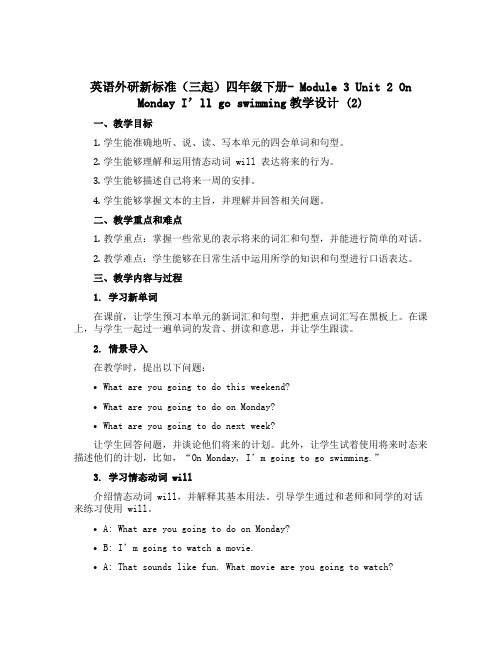
英语外研新标准(三起)四年级下册- Module 3 Unit 2 On Monday I’ll go swimming教学设计 (2)一、教学目标1.学生能准确地听、说、读、写本单元的四会单词和句型。
2.学生能够理解和运用情态动词 will 表达将来的行为。
3.学生能够描述自己将来一周的安排。
4.学生能够掌握文本的主旨,并理解并回答相关问题。
二、教学重点和难点1.教学重点:掌握一些常见的表示将来的词汇和句型,并能进行简单的对话。
2.教学难点:学生能够在日常生活中运用所学的知识和句型进行口语表达。
三、教学内容与过程1. 学习新单词在课前,让学生预习本单元的新词汇和句型,并把重点词汇写在黑板上。
在课上,与学生一起过一遍单词的发音、拼读和意思,并让学生跟读。
2. 情景导入在教学时,提出以下问题:•What are you going to do this weekend?•What are you going to do on Monday?•What are you going to do next week?让学生回答问题,并谈论他们将来的计划。
此外,让学生试着使用将来时态来描述他们的计划,比如,“On Monday, I’m going to go swimming.”3. 学习情态动词 will介绍情态动词 will,并解释其基本用法。
引导学生通过和老师和同学的对话来练习使用 will。
•A: What are you going to do on Monday?•B: I’m going to watch a movie.•A: That sounds like fun. What movie are you going to watch?•B: I will watch the latest Marvel movie.4. 阅读练习让学生读 Module 3 Unit 2,然后回答问题。
(完整版)外研版三起四年级英语下册M3重点句型和短语

(完整版)外研版三起四年级英语下册M3重点句型和短语外研版三起四年级英语下册M3重点句型和短语:一、短语:1、be(am /is/are)going to +动词原形【表示“打算、准备、将要做某事”】2、on Saturday 在星期六3、have a picnic 举行、进行野餐4、will +动词原形【表示将要做某事】5、take your kite 带上你的风筝【take one`s sth.带上某人的东西】6、go swimming 去游泳7、next week 下周8、a holiday 一个假期9、play with my friends和我的朋友玩10、go to the park 去公园11、do my(one`s) homework 做我的(某人的)作业12、visit my grandma 拜访我的奶奶13、help my mother 帮助我妈妈(做家务)14、read my books 看我的书15、lots of rules 许多规则(定)16、let`s start again 让我们再开始吧二、句型1、On Saterday we`re going to have a picnic .星期六我们准备去野餐。
【星期前面用介词on】练习:星期天我打算看电视。
2、Will you take your kite tomorrow?Yes,I will/No,I won`t.明天你将带风筝去吗?是的,我将带。
不,我不会的。
【will的一般疑问句及肯、否定回答】练习:星期一你将要打篮球吗?不,我将不打。
3、Why not ? Because tomorrow is Friday.为什么不呢?因为明天是星期五。
【Why 引导的问句,回答要用beacause开头的句子。
】再如:Why not ? Because my dog is lost .为什么不呢?因为我的狗丢了。
4、So I will take my kite and my ball on Saterday.因此星期六我将带风筝和球。
